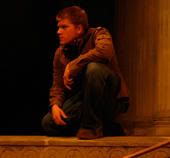A Valediction: Forbidding MourningAs virtuous men pass mildly away,
And wishper to their souls, to go,
Whilst some of their sad friends do say,
The breath goes now, and some say, no:
So let us melt, and make no noise,
No tear-floods, nor sigh-tempests move,
T'were pophanation of our joys
To tell the layety our love.
Moving of the earth brings harms and fears,
Men reckon what it did and meant,
But trepidation of the spheres,
Though greater far, is innocent.
Dull sublunary lovers love
(Whose soul is sense) cannot admit
Absence, because it doth remove
Those things which elemented it.
But we by a love, so much refined,
That our selves know not what it is,
Inter-assured of the mind,
Careless, eyes, lips, and hands to miss.
Our two souls therefore, which are one,
Though I must go, endure not yet
A breach, but an expansion,
Like gold to airy thinness beat.
If they be two, they are two so
As stiff twin compasses are two,
Thy soul the fixed foot, makes no show
To move, but doth, if the other do.
And though it in the center sit,
Yet when the other far doth roam,
It leans, and hearkens after it,
And grows erect, as that comes home.
Such wilt though be to me, who must-
Like the other foot, obliquely run;
Thy firmness draws my circle just,
And makes me end, where I begun.
---John Donne [spelling adapted by me]
Donne's "Valediction" is one of the most beautiful love poems I've ever read. Donne describes relationships as beginningin the sensuous, and journeying to something more transcendent and intimate.
It's hard to move from the first level to the second, but the second level of love is all the more beautiful because it is more genuine. It's also a kind of love that persists: it doesn't die when the people separate.
Donne says that absence cannot kill his love, because his soul is joined to his lover's "like gold to airy thinness beat." Their uniqueness is overwhelmed by a sameness, a oneness that makes them like two legs of a drawing compass.
Finally, the language sounds sexual because it is. Words like "erect" and the ideas of two souls as one and leaning and hearkening after the lover are all obviously potent images. But they're not crass.
I think Donne is trying to say that, instead of killing our appreciation for the bodily experiences of love, the deeper love adds layer and color and depth to the physical experience. They're not enemies, even though some people try to draw them like they're mutually exclusive.
So why do I like this poem? Simple. I feel like he knows what love is. I'd like to believe and participate in a love as complex and rich as this.
-brian

